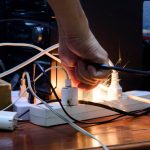 Fire hazards can pose a significant risk to the safety of employees and the overall well-being of a workplace. It is essential for employers and employees alike to be aware of these hazards and take appropriate measures to prevent fires. In this blog post, we will discuss the most common fire hazards in the workplace and provide practical tips on how to avoid them.
Fire hazards can pose a significant risk to the safety of employees and the overall well-being of a workplace. It is essential for employers and employees alike to be aware of these hazards and take appropriate measures to prevent fires. In this blog post, we will discuss the most common fire hazards in the workplace and provide practical tips on how to avoid them.
Electrical Hazards
Electrical hazards are one of the leading causes of fires in workplaces. Overloaded electrical circuits, frayed wires, and faulty electrical equipment can all spark a fire if left unaddressed. To avoid electrical hazards:
1. Regularly inspect electrical equipment: Conduct routine inspections to identify any signs of wear and tear in electrical equipment. Promptly repair or replace damaged wires, cords, or appliances.
2. Avoid overloading outlets: Plugging too many devices into one outlet can overload the electrical circuit, increasing the risk of a fire. Use power strips with built-in circuit breakers to prevent overloading.
3. Train employees on electrical safety: Provide training to your employees on proper usage of electrical equipment, emphasizing the importance of turning off appliances when not in use and reporting any damaged equipment.
Flammable Liquids
Many workplaces, such as manufacturing plants, laboratories, or construction sites, use flammable liquids as part of their daily operations. When not stored and handled correctly, these liquids can easily ignite, causing a fire. Here’s how to avoid flammable liquid-related fires:
1. Store flammable liquids in designated cabinets: Use fire-resistant cabinets specifically designed for storing flammable liquids. These cabinets help contain fires and prevent them from spreading to other areas.
2. Label containers properly: Clearly label all containers that contain flammable liquids to ensure workers can identify and handle them safely. This reduces the risk of accidental spills or mixing of incompatible substances.
3. Control ignition sources: Keep flammable liquid storage areas away from sources of ignition such as open flames, sparking machinery, or electrical equipment. Regularly inspect and maintain equipment to prevent malfunction or sparks.
Poor Housekeeping
Cluttered workspaces can impede evacuation in case of a fire and provide fuel for flames. Neglecting housekeeping duties can contribute significantly to the spread of fires. To improve housekeeping and minimize fire hazards:
1. Keep aisles and exits clear: Ensure that hallways, doorways, and emergency exits are always free from obstructions. Clear pathways facilitate swift evacuation during an emergency.
2. Dispose of waste materials correctly: Properly dispose of flammable waste materials, such as paper, cardboard, or packaging materials, in designated waste containers. Regularly empty these containers to prevent them from overflowing.
3. Control smoking areas: Restrict smoking to designated areas and provide ashtrays that are fire-resistant and emptied frequently. Implement a strict “no smoking” policy in high-risk areas like chemical storage areas or near flammable materials.
Faulty Heating and Electrical Systems
Improperly maintained heating systems and electrical systems can lead to fires. To reduce the risk:
1. Inspect and maintain heating systems: Regularly inspect and maintain heating systems to ensure they are in good working order. Replace any faulty or damaged parts promptly, and clean or replace air filters regularly.
2. Test smoke alarms and fire suppression systems: Test smoke alarms and fire suppression systems regularly to ensure they are in proper working condition. Replace batteries in smoke alarms as needed.
3. Avoid excessive use of extension cords: Overreliance on extension cords is a common cause of electrical fires. Whenever possible, use permanent wiring instead of extension cords. If extension cords must be used, ensure they are not damaged, and do not overload them.
Conclusion
By being aware of common fire hazards in the workplace and implementing preventive measures, employers and employees can significantly reduce the risk of fires. Regular maintenance, effective employee training, and proper storage and disposal practices are essential in creating a safe work environment. Investing in fire prevention can save lives and protect valuable assets. Stay vigilant and take action to prevent fires in your workplace.
Got Questions? Let Us Help!
Carpet Capital Fire Protection, Inc. is your fire protection specialist in Dalton and the surrounding areas in Northern Georgia. With over 40 years of experience, we always go above and beyond our customers’ requests and expectations in order to ensure all of their fire protection needs. The founder of Carpet Capital Fire Protection Inc. wanted to create a fire protection company in the area that guaranteed a better quality of work, better prices, and a better overall customer relationship. We will help to ensure that your property meets local or state fire codes, insurance fire codes, and municipality-related fire codes. Contact us today to learn more about what we can do for you!
